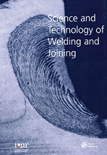
SCIENCE AND TECHNOLOGY OF WELDING AND JOINING
Scope & Guideline
Advancing the Frontiers of Welding Science and Technology
Introduction
Aims and Scopes
- Welding Processes and Techniques:
Investigates various welding methodologies, such as TIG, MIG, laser welding, and friction stir welding, focusing on their operational parameters, efficiencies, and applications in industrial contexts. - Material Characterization and Performance:
Examines the effects of welding on the microstructural and mechanical properties of materials, including studies on different alloys and composites, assessing their performance under various conditions. - Additive Manufacturing and Advanced Joining:
Explores innovative joining processes, including additive manufacturing approaches, that enhance the capabilities and applications of traditional welding technologies. - Defect Analysis and Quality Control:
Focuses on the identification, analysis, and mitigation of defects in welded joints, employing advanced monitoring and inspection techniques to ensure the integrity and reliability of welds. - Numerical and Experimental Modeling:
Utilizes computational and experimental methods to model welding phenomena, predict outcomes, and optimize welding parameters for better performance and quality.
Trending and Emerging
- Hybrid Welding Techniques:
There is a growing interest in hybrid welding processes that combine multiple methods, such as laser-arc welding, to enhance efficiency and joint quality, reflecting industry demands for improved performance. - Dissimilar Material Joining:
Research focused on the challenges and techniques for joining dissimilar materials is on the rise, driven by the need for innovative solutions in sectors like aerospace and automotive, where multi-material structures are common. - Additive Manufacturing Integration:
The integration of additive manufacturing with traditional welding processes is emerging as a significant area of research, emphasizing the development of new materials and techniques that facilitate advanced manufacturing capabilities. - Smart Welding Technologies:
Emerging themes related to smart technologies in welding, including the use of machine learning and real-time monitoring systems, are gaining traction, reflecting the industry's push towards automation and enhanced quality control. - Sustainability in Welding Practices:
There is an increasing focus on sustainable welding practices, including energy-efficient methods and the use of eco-friendly materials, as industries are pressured to adopt greener technologies.
Declining or Waning
- Traditional Welding Techniques:
Research surrounding conventional welding methods, such as shielded metal arc welding, appears to be decreasing as newer technologies gain prominence and as industries seek more advanced solutions. - Basic Welding Materials Studies:
There is a noticeable reduction in papers solely focused on basic studies of welding materials without the application of advanced techniques or innovative processes, indicating a shift towards more complex and integrative approaches. - Surface Treatment Techniques:
The prevalence of studies centered on surface treatments prior to welding has diminished, possibly due to the growing interest in integrated processes that consider surface preparation as part of the overall welding methodology.
Similar Journals
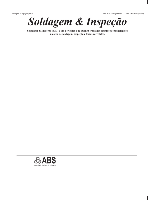
Soldagem & Inspecao
Exploring New Horizons in Welding and Materials ScienceSoldagem & Inspecao, published by the ASSOC BRASIL SOLDAGEM, is a prominent open-access journal dedicated to the fields of Mechanical Engineering, Mechanics of Materials, and Metals and Alloys. Since 2009, this journal has provided a platform for researchers and professionals to share their findings in welding and inspection technology, contributing to significant advancements in material science. With its ISSN 0104-9224 and E-ISSN 1980-6973, "Soldagem & Inspecao" is indexed in Scopus and ranks in the fourth quartile for 2023 across several engineering categories. Despite its nascent metrics, the journal serves as an essential resource for students, professionals, and academics alike, enabling readers to stay updated with the latest research developments. The journal is based in São Paulo, Brazil, and actively encourages contributions that foster innovation and scientific inquiry in the welding community. By disseminating research that emphasizes practical applications and theoretical insights, "Soldagem & Inspecao" plays a vital role in bridging the gap between academic research and industry practices.
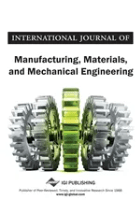
International Journal of Manufacturing Materials and Mechanical Engineering
Pioneering research for the future of manufacturing.International Journal of Manufacturing Materials and Mechanical Engineering, published by IGI GLOBAL, is a pivotal platform dedicated to the advancements in the fields of mechanical engineering and materials science. With an ISSN of 2156-1680 and an E-ISSN of 2156-1672, this journal has been addressing key contemporary issues since its inception in 2011, aiming to foster high-quality scholarly communication through impactful research until 2024. Despite its ranking in the Q4 category for both Mechanical Engineering and Mechanics of Materials in 2023 and its Scopus rankings placing it at the 49th and 44th percentiles respectively, the journal serves as an essential resource for researchers and professionals seeking to stay ahead in their fields. By incorporating rigorous peer-reviewed articles and innovative study findings, the journal not only enhances knowledge but also influences future research and practices in manufacturing and mechanical engineering. Researchers, practitioners, and students alike will find this journal invaluable for keeping abreast of emerging trends and technological advancements.
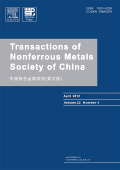
TRANSACTIONS OF NONFERROUS METALS SOCIETY OF CHINA
Fostering excellence in materials science and engineering.TRANSACTIONS OF NONFERROUS METALS SOCIETY OF CHINA, published by Elsevier, is a premier academic journal that serves as a vital platform for researchers and professionals specializing in materials science, condensed matter physics, geotechnical engineering, and engineering geology. Established in 1994, this esteemed publication has maintained a robust focus on the latest developments in the nonferrous metals sector, reflecting its significant impact in the field with a Q1 categorization across multiple disciplines. With impressive Scopus rankings—placing it in the top 20% of journals in relevant categories—this journal is recognized for its quality and rigor, providing critical insights into metals and alloys, materials chemistry, and their applications. The non-open access format ensures a dedicated readership among professionals and academics seeking substantial and authoritative research articles. By fostering knowledge exchange, the journal strives to advance the understanding and application of nonferrous metals, making it an essential resource for anyone involved in material innovations and engineering solutions.
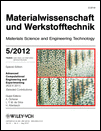
MATERIALWISSENSCHAFT UND WERKSTOFFTECHNIK
Innovating Tomorrow's Materials Today.MATERIALWISSENSCHAFT UND WERKSTOFFTECHNIK, published by WILEY-V C H VERLAG GMBH, is a prominent journal dedicated to the field of materials science and engineering. With its ISSN 0933-5137 and E-ISSN 1521-4052, this journal serves as a vital resource for researchers and professionals engaged in exploring the intricate relationships between the properties of materials and their applications. Established in 1970 and continuing through 2024, the journal has been consistently recognized in various categories, achieving a Q3 ranking in 2023 across Condensed Matter Physics, Materials Science (miscellaneous), Mechanical Engineering, and Mechanics of Materials. Although it does not offer open access, its high-quality peer-reviewed content is fundamental to the advancement of knowledge within its three key areas: novel material development, material characterization, and application of materials in engineering contexts. As a driving force in the scientific community, MATERIALWISSENSCHAFT UND WERKSTOFFTECHNIK continues to cater to the curiosity of aspiring students, seasoned professionals, and researchers alike, facilitating a deeper understanding of the complexities of material technology.
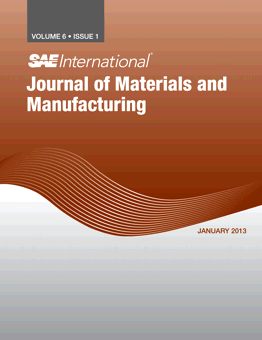
SAE International Journal of Materials and Manufacturing
Fostering Innovation through Rigorous ResearchSAE International Journal of Materials and Manufacturing, published by SAE International, is a leading peer-reviewed journal that focuses on the advancements and research in the fields of materials science and manufacturing engineering. With ISSN 1946-3979 and E-ISSN 1946-3987, this journal is an essential resource for researchers, professionals, and students who are keen on exploring innovative materials and modern manufacturing techniques. Although the journal currently does not offer open access options, its rigorous selection process ensures the publication of high-quality papers that contribute significantly to the knowledge base in the industry. Recognized within the third and fourth quartiles across various engineering categories, including Industrial and Manufacturing Engineering and Mechanical Engineering, the journal provides an impactful platform for disseminating groundbreaking research. With a converged history since 2002 and a comprehensive approach to critical topics in mechanics of materials, it empowers the academic community with vital insights, trends, and methodologies that propel the future of manufacturing excellence.

METALS AND MATERIALS INTERNATIONAL
Connecting researchers to the forefront of materials science.METALS AND MATERIALS INTERNATIONAL, published by the Korean Institute of Metals and Materials, is a prestigious journal dedicated to the advancement of research in the fields of materials science and engineering. With an ISSN of 1598-9623 and a robust e-ISSN of 2005-4149, this journal has established itself as a crucial platform for disseminating innovative findings and key advancements that span condensed matter physics, materials chemistry, mechanics of materials, and the technology of metals and alloys. Its Q1 rankings in multiple categories attest to its high impact and relevance in the academic community, placing it among the top journals in its fields with Scopus rankings that reflect a strong international footprint. Here, researchers, professionals, and students can access cutting-edge research and insights, fostering collaboration and exploration of new materials and their applications. With a commitment to excellence and a convergence of knowledge from 1996 to 2024, METALS AND MATERIALS INTERNATIONAL continues to enhance our understanding of materials and their transformative impact on technology and engineering.
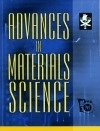
Advances in Materials Science
Connecting Researchers to Revolutionize Materials ScienceAdvances in Materials Science, published by SCIENDO, is a pivotal journal in the field of materials science that focuses on the latest developments and breakthroughs in the study and application of innovative materials. With a commitment to advancing knowledge across various sub-disciplines, this journal provides a platform for researchers, professionals, and students to share their findings, explore new methodologies, and discuss the implications of materials science on technology and industry. The journal, indexed under the ISSN 2083-4799 and E-ISSN 2083-4799, promotes open dissemination of research, encouraging a collaborative approach to problem-solving across disciplines. Its emphasis on high-quality, peer-reviewed articles positions it as an influential resource within the academic community, driving forward the boundaries of what is possible in materials science. Advances in Materials Science continues to be an essential read for anyone dedicated to understanding and innovating in the materials domain.

RARE METAL MATERIALS AND ENGINEERING
Transforming Ideas into Engineering SolutionsRARE METAL MATERIALS AND ENGINEERING is a vital academic journal dedicated to advancing the fields of materials science, engineering, and metallurgy. Published by the NORTHWEST INST NONFERROUS METAL RESEARCH in China, this journal has been an essential resource for researchers and professionals since its inception in 1993. With a focus on rare metals and their engineering applications, the journal addresses contemporary issues and innovations in materials chemistry and electronic engineering, providing insights into the properties and uses of advanced materials. Although it currently falls within the Q4 category for several categories, including Electrical and Electronic Engineering and Materials Chemistry, its commitment to quality and relevance in the field is evident. The journal offers a platform for researchers to share their findings with the scientific community, fostering collaboration and knowledge exchange in an important area of study. Researchers and students interested in exploring the latest in rare metal technologies and engineering methodologies will find this journal a valuable addition to their academic library.

Manufacturing Technology
Innovating Industrial Processes for TomorrowManufacturing Technology is a respected journal dedicated to advancing the field of industrial and manufacturing engineering. Published by the Jan Evangelista Purkyne University in the Czech Republic, this journal serves as a vital resource for researchers, professionals, and students interested in the latest developments and technologies in manufacturing processes. With an ISSN of 1213-2489 and E-ISSN 2787-9402, it has carved its niche as a Q3-ranked journal in the 2023 category of Industrial and Manufacturing Engineering on Scopus, showcasing its commitment to high-quality research, evidenced by its standing among the top publications in its field. Although not an open-access journal, it fosters significant academic exchange through its collection of research articles and reviews that span a diverse range of topics. The journal's reach is expanded, having existed for over a decade, with converged years from 2011 to 2024. As manufacturing technologies continue to evolve, Manufacturing Technology remains a key platform for disseminating innovative research, ensuring its relevance and impact within the academic community.

Metallography Microstructure and Analysis
Transforming Metallurgical Research for Tomorrow's TechnologiesWelcome to Metallography Microstructure and Analysis, a prominent journal dedicated to the exploration of microstructural properties and their implications in metallic materials. Published by SpringerNature, this journal stands at the forefront of research in the field of materials science, particularly focusing on metals and alloys. With an impressive Q2 ranking in 2023 within its category and a Scopus rank of #72 out of 176, it continues to provide significant contributions to the understanding of metallography, attracting diverse readership among researchers, industry professionals, and students alike. The journal spans a converged period from 2012 to 2024, ensuring it captures the evolving landscape of metallurgical studies. Although it does not currently offer open access, this platform is essential for disseminating high-quality, peer-reviewed research that fosters innovation and development in metallurgical practices.